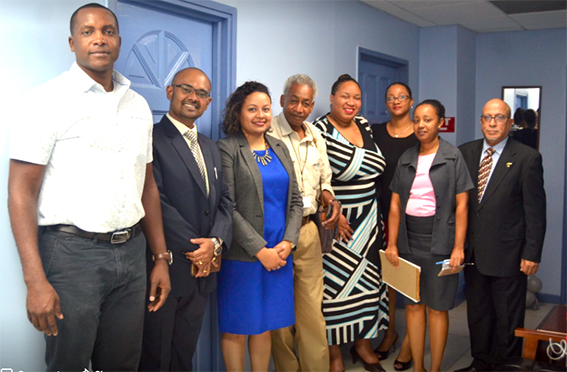A team from the Cancer Institute of Guyana (CIG) recently return-ed from a visit to St. Lucia after introducing the treatment for cervical cancer through brachytherapy technology at a reduced cost.
The team, which comprised Consultant Oncologist, Dr. Sayan Chakraborty; Director of Outreach, Dr. Syed Ghazi and General Manager, Fiona Legall, met with officials from the island’s Ministry of Health & Wellness (MoHW).
They first met briefly with the ministry’s Permanent Secretary (PS), Cyprian Felix St. Hill in his office along with other officials; Oncologist, Dr. Owen Gabriel; Medical Officer of Health, Sharon Belmar-George; Senior Medical Officer – Infectious Diseases, Michelle Francois; Community Nursing, Alicia Alexander; Medical Director (MD), St. Jude Hospital and MD and Senior MD of Victoria Hospital, Denis Laurencin and Alisha Eugene respectively.
They subsequently proceeded to the conference room with the other officials to elaborate more about the types of services offered.
The CIG is hoping to renew its partnership with St. Lucia and urge the government to take advantage of the treatment via the new state-of-the-art machine.
Legall noted that over three years ago some 16 patients from St. Lucia benefited from firsthand medical care at the CIG.
Medical assistance
The PS said that patients are unable to pay for their treatment and that the MoHW is providing medical assistance in terms of covering the cost. The patients are now being treated in Martinique and Barbados.
Dr. Owen Gabrielle indicated that the response from the patients who sought treatment in Guyana, was that it was done with ease and comfort.
He also noted that Legall looks into the accommodation and transportation of the patients and said: “Patients tend to want to go where they have quality service.”
Another plus with seeking the services in Guyana, he said, is that “the cost is fifty to seventy-five percent less than the other countries.”
He pointed out that he first started sending patients from his private office and that the service was later extended to patients at the Victoria Hospital.
He said he was always in constant contact with Dr. Chakraborty, who stressed that the service in Guyana is done through teamwork.
Dr. Gabriel was also happy to say that he facilitated the initial St. Vincentian patients who visited Guyana for treatment.
Dr. Chakraborty, encouraged the use of radiation and said that based on a study he conducted between 2013 and 2015, it was found that the recurrence [of cancer] after the surgery was much higher than recurrence after the radiation.
With regards to foreign cancer patients, he noted that they are already going through a lot psychologically and when they leave their homes, it is not only the medical benefit they need but also the moral support.
Top three
Dr. Ghazi said that over the last three years, the CIG has been receiving grants from the Australian High Commission and the Healthy Caribbean Coalition to conduct cervical cancer outreaches in interior communities in Guyana.
He was proud that the two entities have placed the CIG among the top three of the good respondents to the campaign to eliminate cervical cancer by 2025.
Legall added that of the 1300 outreach patients screened so far under the project, six were tested positive and treated.
Dr. Ghazi also pointed out that a Pan-American Health Organization report states that 1.4 million people die of cancer each year in the Americas. Of that, 36,000 women die of cervical cancer.
Meanwhile, he emphasized that the CIG recognized that the fight against cervical cancer is not only for women in Guyana but from other Caribbean countries as well where the service is not readily available.
“It is a humanitarian effort first, then business; we are passionate about fighting cancer,” he told the officials. “We are offering our services at a cheaper cost because of compassion.”
Explaining how the CIG was initiated, he said the owner, George Nella visited Guyana in 2006 and saw cancer patients in the third and forth stages with no access to treatment.
He is also happy to be associated with a team of compassionate staff and said when patients who cannot afford, walk through the door at CIG, they do not leave without being treated.










